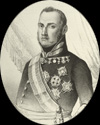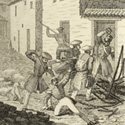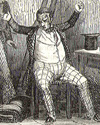19th Century´s militar history in the Basque Country
VICENTE QUESADA. (1782-1836)
 Son of the governor of Nicaragua, Quesada was born in La Habana in 1782. He was educated as a soldier and fought against the French in 1808 under the orders of the Junta de Extremadura for that region and Castile. In November, he was injured and taken prisoner in Burgos. He was taken to diverse prisoner camps in France, from which he fled three times until September 1811, when he finally met up with the Spanish troops in the peninsula.
Son of the governor of Nicaragua, Quesada was born in La Habana in 1782. He was educated as a soldier and fought against the French in 1808 under the orders of the Junta de Extremadura for that region and Castile. In November, he was injured and taken prisoner in Burgos. He was taken to diverse prisoner camps in France, from which he fled three times until September 1811, when he finally met up with the Spanish troops in the peninsula.
Ferdinand VII appointed him brigadier because of his actions during the War of Independence and because he was not among the Liberal soldiers who had defended the Constitution of Cádiz and had hence suffered retaliation or exile. He was also named governor of the cuatro villas de la costa de Santander (Four Towns of the Coast of Santander).
During the Liberal Triennium, he fled to France to join the conspirators of the Regency of Urgel and General Eguía. He held command of the royalist army of Navarre, where he met and commanded Tomás Zumalacárregui. Following the Liberal defeat and restoration of Ferdinand VII as absolute monarch, he was promoted to lieutenant general.
Over subsequent years, he began to distance himself from more intolerant stances. In 1833, Maria Christina appointed him commanding general of the Royal Infantry Guard with the task of purging the corps of royalist soldiers or those suspected of sympathising with Don Carlos. The acting queen also granted him the title of Marquis of Moncayo..
 He replaced Valdés at the command of the Northern Army but failed - as did his predecessor - in his task of bringing peace to the Basque country. With the arbitration of Miguel Antonio Zumalacárregui, brother of the Carlist general, he tried to convince the latter to abandon Don Carlos in exchange for going without punishment for his stance during the initial months of the conflict. The correspondence between Quesada and Tomás Zumalacárregui came to a bitter end when the Liberal addressed his final letter to "Zumalacárregui, leader of the bandits and highwaymen". Quesada began a period of extreme cruelty and summary shootings that led to a "war without quarter".
He replaced Valdés at the command of the Northern Army but failed - as did his predecessor - in his task of bringing peace to the Basque country. With the arbitration of Miguel Antonio Zumalacárregui, brother of the Carlist general, he tried to convince the latter to abandon Don Carlos in exchange for going without punishment for his stance during the initial months of the conflict. The correspondence between Quesada and Tomás Zumalacárregui came to a bitter end when the Liberal addressed his final letter to "Zumalacárregui, leader of the bandits and highwaymen". Quesada began a period of extreme cruelty and summary shootings that led to a "war without quarter".
 Liberal Northern Army and sent to Madrid as the commanding general of the Royal Guard and Capitán General (governor general) of Castilla la Nueva. In August 1835, he crushed an insurrection by the Urban Militias in Madrid. The uprising of La Granja took place a year afterwards. However, this time Quesada could not put down the revolt. He was forced to flee from Madrid, but was arrested at Hortaleza. While imprisoned there, the masses from Madrid came, murdered and quartered the man who had, up until then, been an influential soldier and politician: Vicente Quesada.
Liberal Northern Army and sent to Madrid as the commanding general of the Royal Guard and Capitán General (governor general) of Castilla la Nueva. In August 1835, he crushed an insurrection by the Urban Militias in Madrid. The uprising of La Granja took place a year afterwards. However, this time Quesada could not put down the revolt. He was forced to flee from Madrid, but was arrested at Hortaleza. While imprisoned there, the masses from Madrid came, murdered and quartered the man who had, up until then, been an influential soldier and politician: Vicente Quesada.

